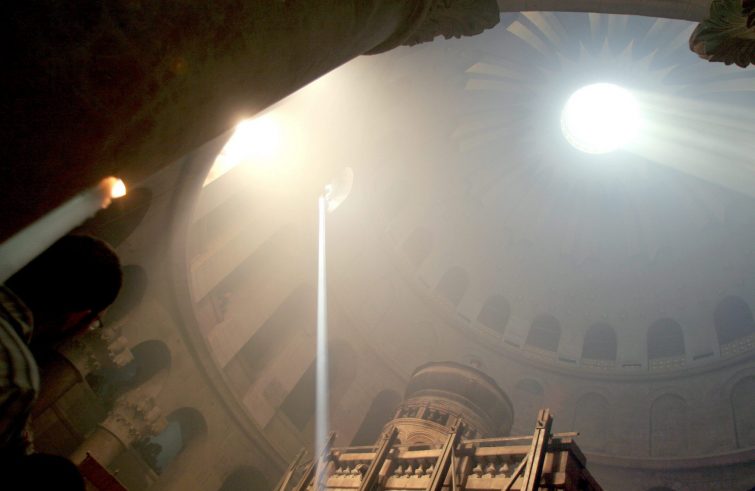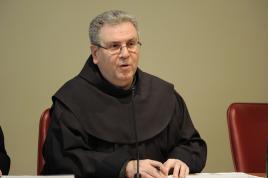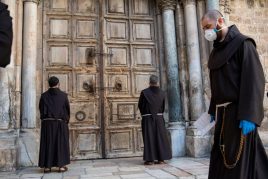
“It will be a low-key Easter in terms of celebrations, yet it will lack nothing of its deepest Mystery: the Resurrection by which Christ defeated death forever. It’s the foundation of our faith and hope.”
“Easter is not a myth, it’s the truth to which we cling.”
 From Jerusalem, the Custos of the Holy Land, Father Francis Patton, invites us to “raise our eyes to Christ’s empty tomb” and not to “stop our hearts at Good Friday”. More than ever this coming Easter will be celebrated in the name of the Resurrection despite the Coronavirus Covid-19. So far, the pandemic in Israel has left thousands infected and dozens of victims. For this reason national authorities have ordered, inter alia, the closure of the Basilica of the Holy Sepulchre. For the first time, in living memory, Easter celebrations will take place without the participation of the faithful and groups of pilgrims, all of which have been cancelled. A closed-door Easter, unless otherwise decided at the last minute by the Israeli authorities. Over the past few days the heads of the three Christian Communities based in the Basilica, the Greek Orthodox and Armenian Patriarchs of Jerusalem, Theophilus III and Nourhan Manougian, together with the Custos of the Holy Land, had ensured the continuation of the prayers and celebrations inside the Holy Site in full compliance with the protective measures adopted to stem the spread of the virus. But on 25 March, the Israeli Police ordered the precautionary closure of the Basilica of the Holy Sepulchre.
From Jerusalem, the Custos of the Holy Land, Father Francis Patton, invites us to “raise our eyes to Christ’s empty tomb” and not to “stop our hearts at Good Friday”. More than ever this coming Easter will be celebrated in the name of the Resurrection despite the Coronavirus Covid-19. So far, the pandemic in Israel has left thousands infected and dozens of victims. For this reason national authorities have ordered, inter alia, the closure of the Basilica of the Holy Sepulchre. For the first time, in living memory, Easter celebrations will take place without the participation of the faithful and groups of pilgrims, all of which have been cancelled. A closed-door Easter, unless otherwise decided at the last minute by the Israeli authorities. Over the past few days the heads of the three Christian Communities based in the Basilica, the Greek Orthodox and Armenian Patriarchs of Jerusalem, Theophilus III and Nourhan Manougian, together with the Custos of the Holy Land, had ensured the continuation of the prayers and celebrations inside the Holy Site in full compliance with the protective measures adopted to stem the spread of the virus. But on 25 March, the Israeli Police ordered the precautionary closure of the Basilica of the Holy Sepulchre.
“Over the course of history – recalls Father Patton – Christians often had no other option than to live Easter with their heart fixed on Good Friday. I refer to many of our brothers and sisters who continue to live Easter today in situations of conflict and war, as in Syria and Libya. But the Easter light must shine into these very situations, as well as those of suffering and death.”
Father Patton, we will be celebrating coming Easter in the midst of a pandemic. What will it be like?
Easter is the mainspring of our life: Jesus won over death. Not by avoiding it, by eluding it, but by passing through it. Likewise, many people experience this moment in communion with Him here on the Calvary. I believe that this message is particularly important for those who suffer, for those who find themselves living their personal Easter, their own death: knowing that Easter does not mean entering into nothingness but that it involves traversing death accompanied by Jesus, the master of life. The human and emotional experience of suffering and fear remains, but for the Christian believer, death is lightened by Jesus’ Easter.
- Foto Custodia Terra Santa
It will be an Easter of the empty Sepulchre and the empty basilica. We are used to seeing a Holy Sepulchre always full of pilgrims…
There are different empty spaces which need to be correlated.
The empty tomb is the sign of the Resurrection, of victory over death. The empty Basilica is in some ways a reflection of the emptiness or feeling of emptiness that humanity is experiencing today. That sense of fragility and dismay that is filled by the Sepulchre left empty by the Risen Christ.
While external signs are lacking, the sign of the faith helps us give meaning to the present moment.
With regard to the ” feeling of fragility”: never before has humanity been so fragile and helpless in the face of a threat of an invisible and lethal virus. The feeling of almightiness that pervaded our lives vanished under the blows of a pandemic. Is this the Easter of human frailty?
We are becoming aware of our inherent human frailty. People who are suffering and sick are personally experiencing this frailty. Just as we experience entrusting ourselves to doctors, we also experience entrusting ourselves to the hands of the Risen Christ. Jesus’ words on the Cross, “My God, why have you forsaken me?”, are a true expression of His dramatic encounter with suffering, with death. When Jesus says: “Father into your hands I commit my spirit”, he goes so far as to willingly surrender His spirit to the hands of the Father. I believe that this is the path of every believer at a time of suffering, whether it leads to death or to healing:
It’s the feeling of abandoning oneself to the hands of the Father.
Thus, our journey is not in vain and it does not stop at a tombstone. Easter reminds us that Jesus is more powerful than anything, more than any form of evil, including physical illness, including death.”
It will also be Passover for the Jews (9-16 April). Israel, struggling with the virus, is reporting deaths and infections…
The Jewish Passover celebrates the passage of the angel of death, during the night of the tenth plague, into the homes of the Egyptians to strike down the firstborn of every household, ‘passing over’ those of the Jews marked by the blood of the sacrificial lamb. Passover is not only delivery from slavery it’s also liberation from death. The Jewish people, as well as the Muslims, are gathered in deep prayer. In this respect, I have read the declaration of the Great Imam of Al Azhar, Ahmad Al-Tayyeb, who invited everyone to pray in a spirit of fraternity, as hoped for in the “Document on Human Brotherhood, for World Peace and Common Coexistence”, co-signed by Pope Francis in Abu Dhabi. Ramadan begins soon (April 24, ed.’s note). At this time all the children of Abraham are called to raise their prayers to the One and Almighty God. We are all united by prayer.”
 The Sepulchre will remain empty, will the Basilica return to be full?
The Sepulchre will remain empty, will the Basilica return to be full?
Of course it will! The pilgrims will return as they returned after the Intifada of 2000. Once the pandemic is over, I hope towards the end of the summer, we will again see many pilgrims. It will be a sign of hope for the local Christian community that through pilgrimages feels a deep sense of belonging to the universal Church and thrives on it.
The Church of Jerusalem opens her arms to humanity frightened and wounded by the pandemic and is preparing to console it. God will bring out what is good even from this shared suffering.














